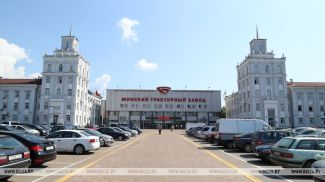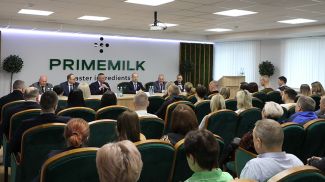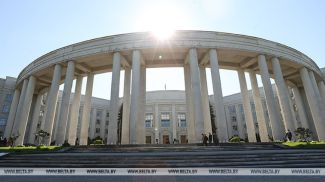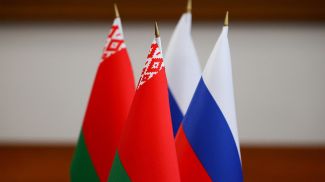MINSK, 20 February (BelTA) – Private farmers may become a driver of economic growth in Minsk Oblast in the medium term. It may have a positive effect on living standards of the population. Minsk Oblast Governor Aleksandr Turchin made the statement during a conference held on 20 February to discuss the development of private farming enterprises in the region, BelTA has learned.
Addressing the farmers, the governor pointed out that the Minsk Oblast administration had started working out a program on the region's development in the next five-year term. Its key goal is to increase the living standards and quality of life of the population, form a comfortable living environment by bolstering the competitive ability of Minsk Oblast economy through effective and rational use of the available resources. “Private farmers may become a driver of economic growth in the medium term,” the governor believes.
In his words, Minsk Oblast agriculture accounts for nearly one fourth of the merchandise made in Belarus. More than 2,500 people work in agribusiness enterprises in Minsk Oblast. “We are convinced that entrepreneurship in rural areas helps develop rural territories, contributes to higher revenues of the population, higher tax revenues, and to the resolution of employment problems. Farming in Minsk Oblast is homogenous: most of the enterprises specialize in crop farming. Organic farming has a great development potential in Minsk Oblast,” Aleksandr Turchin noted. He encouraged farmers to speak up about their problems and present their vision of prospects of development of rural entrepreneurship in Minsk Oblast.
Aleksandr Turchin said: “I would like to hear whether state support procedures work at the local level, what impedes entrepreneurship in the countryside, what branches are suitable for effective development on a permanent basis, what regions private farmers are most attracted to. We've had 54 complaints and petitions from heads of private farming enterprises over the course of three years. Most of them dealt with the allocation of land plots. The other problems are related to the acquisition of machines and equipment, the allocation of preferential-rate loans, the acquisition of ineffectively used state properties. We should get in touch with heads of the district administrations to find out what problems we encounter when people want land while we cannot give it to them.”
The governor's view was backed by Igor Pakush, the head of a private farming enterprise from Molodechno District. The farmer specializes in growing vegetables. He started his business with a land plot of 15ha and now owns 1,500ha. He employs 30 permanent workers and about 600 seasonal ones. The farmer noted: “Private farmers are no longer an experiment launched in the 1990s. The government has to recognize the fact and enable positive conditions to help businessmen settle down in the countryside. Private farmers should be considered as investors, who are ready to invest labor, experience, and finance in land in the long run. It is important to work out programs to simplify the allocation of lands for private farming (it is our main problem) and provide opportunities for building commercial properties and housing, for developing infrastructure in the countryside.”
Chairman of the Minsk Oblast Association of Peasant (Farmer) Enterprises Nikolai Silin believes that the volume of revenues of rural business can be doubled or tripled now but it is important to resolve the problem of land allocation and allow farmers to sell their products without having to travel far. In his words, private farmers account for 41% of the potatoes and 63% of the vegetables grown in Minsk Oblast. “It is necessary to develop these avenues and improve the figures. The potential for it is available,” he said.
At present Minsk Oblast is home to 785 private farmers. As many as 49 of them started their business in 2019. The number of private farmers increased by 17% over the last five years. The total area of agricultural land used by private farmers in Minsk Oblast amounts to 49,600ha. The figure increased by 24.6% in the last five years.
The largest private farming enterprises in Minsk Oblast include Vysokaya Starina (Pukhovichi District), Tsnyanskiye Ekoprodukty (Bulbaland trademark, Logoisk District), KKh Pakusha I.A. (Molodechno District), KKh Nekhvyadovicha I.I. (Volozhin District).











